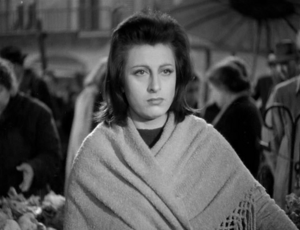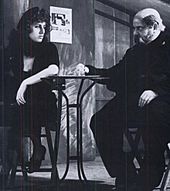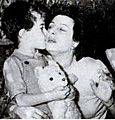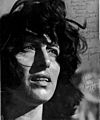Anna Magnani facts for kids
Anna Maria Magnani (born March 7, 1908 – died September 26, 1973) was a famous Italian actress. She was known for her powerful acting and for playing realistic characters, especially strong women. People often called her "La Lupa," which means "The She-Wolf," because of her fiery personality and intense acting style.
Anna Magnani was born in Rome, Italy. She studied acting at the Academy of Dramatic Art in Rome. To pay for her studies, she sang in nightclubs. She became a very important figure in Italian cinema. Many people, including famous directors and writers, admired her talent. Director Roberto Rossellini called her "the greatest acting genius" of her time.
Playwright Tennessee Williams was so impressed by her acting that he wrote the movie The Rose Tattoo (1955) especially for her. For this role, Anna Magnani won an Academy Award for Best Actress. She was the first Italian actress, and the first woman who didn't speak English as her first language, to win an Oscar.
Her career took off internationally after she starred in Rossellini's film Rome, Open City (1945). This movie helped start a new style of filmmaking called Italian neorealism. She became famous for playing strong, everyday women in films like L'Amore (1948), Bellissima (1951), and Mamma Roma (1962).
Contents
Early Life and Training
Anna Magnani's early life has some mystery. Some say she was born in Rome, while others suggest she was born in Egypt. Her mother was Marina Magnani. Film director Franco Zeffirelli believed she was born in Alexandria, Egypt, and later moved to Rome to be raised by her grandmother. However, Magnani herself said she was born in Rome.
She went to a French convent school in Rome. There, she learned French and how to play the piano. She also discovered her love for acting by watching the nuns perform Christmas plays. She attended this school until she was 14 years old.
As a child, she was described as quiet and a bit sad. Her grandparents tried to cheer her up with food and clothes. But she preferred to be around "common people" and enjoyed the "life of the streets." She once said, "I hate respectability. Give me the life of the streets, of common people."
At 17, she studied at the Eleonora Duse Royal Academy of Dramatic Art in Rome for two years. To support herself, she sang in nightclubs and cabarets. Some called her "the Italian Édith Piaf" because of her singing. However, her friend Micky Knox said she learned acting more by instinct than by formal study. He said she could easily show emotions and make an audience believe her characters were real. She was known as a great theater actress in plays like Anna Christie.
Becoming a Film Star
In 1933, Anna Magnani was performing in plays in Rome when she was noticed by Italian filmmaker Goffredo Alessandrini. They got married that same year.
Her first big film role was in The Blind Woman of Sorrento (1934). Later, she worked with director Vittorio De Sica in Teresa Venerdì (1941). De Sica considered this her "first true film." He described her laugh as "loud, overwhelming, and tragic."
Rome, Open City (1945)
Anna Magnani became famous around the world for her role as Pina in Roberto Rossellini's movie Rome, Open City (1945). This film showed Italy during the final days of German occupation in World War II. Magnani's character, Pina, dies while trying to protect her husband, who is fighting against the Nazis. This powerful scene helped make the film, and Magnani, very well-known.
Working with Rossellini and Other Directors
After Rome, Open City, Magnani worked with Rossellini again on L'Amore (1948). This film had two parts. In one part, she played a peasant woman who believes her baby is Christ. In the other, she played a woman trying to save a relationship over the phone. Her acting showed deep sorrow and despair.
Later, Rossellini chose another actress for a film he had promised Magnani. This ended their personal and professional relationship. Magnani then starred in Volcano (1950), which was filmed at the same time as Rossellini's movie. There was a lot of talk about the rivalry between the two films and their lead actresses.
In Luchino Visconti's Bellissima (1951), Magnani played Maddalena. She was a determined mother who takes her daughter to a beauty contest, hoping she will become a star. Her performance showed a wide range of emotions, from anger to deep motherly love.
She also starred in Jean Renoir's film The Golden Coach (1952). Renoir called her "the greatest actress I have ever worked with."
Hollywood Success: The Rose Tattoo (1955)
Anna Magnani made her first English-speaking film in Hollywood, The Rose Tattoo (1955). She played Serafina Delle Rose, a widowed mother. The movie also starred Burt Lancaster. As mentioned earlier, Tennessee Williams wrote this story specifically for her.
Magnani won many awards for her role in The Rose Tattoo, including the Academy Award for Best Actress, the BAFTA Film Award, and the Golden Globes Award. When she won the Oscar, a journalist called her in Rome to tell her the news, and she thought he was joking!
Later Films
Magnani worked with Tennessee Williams again in the 1960 film The Fugitive Kind. She starred alongside Marlon Brando. In this movie, she played a woman who had been through many difficult experiences.
In one of her last film roles, The Secret of Santa Vittoria (1969), she played a wife alongside Anthony Quinn. Their on-screen arguments were very memorable.
She later appeared as herself in Federico Fellini's film Roma (1972). Towards the end of her career, she felt that movies were less about art and more about showing off.
Acting Style
Anna Magnani's acting was known for being very real and emotional. She didn't just play characters; she expressed true feelings. She wasn't seen as a typical "beautiful" Hollywood star, but she had a very expressive face. Her genuine style of acting was different from the glamorous look often seen in Hollywood.
Film critic Robin Wood said her best work in Hollywood was in Wild Is the Wind, directed by George Cukor. Cukor was known for directing actresses well, and he brought out Magnani's sensitive and deep performance.
Personal Life
Anna Magnani married Goffredo Alessandrini, her first film director, in 1935. They separated in 1942.
She had one son, Luca, born in 1942. When Luca was 18 months old, he became ill with polio and lost the use of his legs. Anna Magnani spent much of her early earnings on doctors and hospitals for him. She was determined to earn enough money to always protect him.
In 1945, she started a relationship with director Roberto Rossellini while working on Rome, Open City. They had a strong artistic connection, especially when working on neorealist films. However, their relationship ended when Rossellini fell in love with another actress.
Magnani was interested in mystical things like astrology and numerology. She also believed she could see the future. She ate and drank very little, often living on just black coffee.
Death
Anna Magnani died on September 26, 1973, in Rome, at the age of 65. She passed away from pancreatic cancer. Many people attended her funeral. She was buried in the Cimitero Comunale of San Felice Circeo in southern Lazio.
Images for kids
-
Anna Magnani visiting her son Luca at a sanatorium, around 1947. Luca had polio.
See also
 In Spanish: Anna Magnani para niños
In Spanish: Anna Magnani para niños
 | Toni Morrison |
 | Barack Obama |
 | Martin Luther King Jr. |
 | Ralph Bunche |






